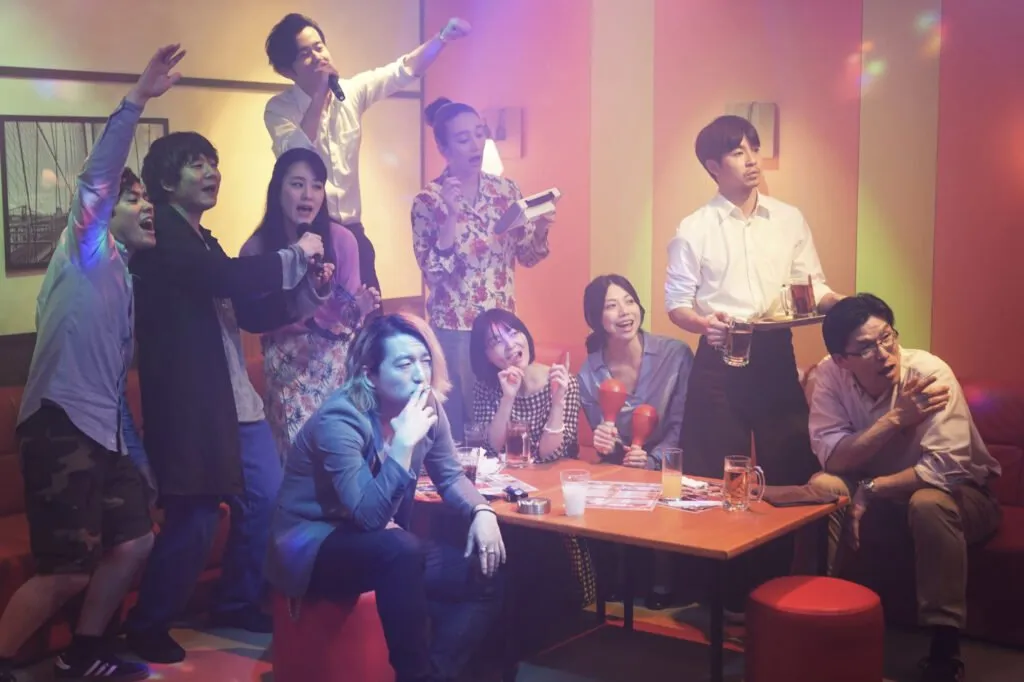It’s nine o’clock on a Saturday……The regular crowd shuffles in…..There’s an old man sittin’ next to me…..And he starts belting out Enka songs from the 1970s…. We all know Karaoke (and many of us curse it every time we go out), but did you know it was born in Kobe? Find out about the (sometimes) enchanting world of karaoke in Japan, its origins, cultural significance, and enduring popularity.

A Musical Revolution
The word “karaoke” itself holds a delightful meaning: “kara” translates to “empty,” and “oke” is an abbreviation of “orchestra” (which is the kind of Japlish that was popping up everywhere in the 1970s!). In essence, karaoke signifies the joy of singing along to instrumental tracks, turning empty spaces into musical stages. Karaoke as we know it today was invented by Daisuke Inoue, a Japanese musician, in the early 1970s. His creation, the Juke-8, allowed patrons in his Kobe-based snack bar to sing along to popular songs.
Inoue’s biggest contribution was understanding the difficulty amateurs had in singing pop songs, recording his own versions of popular songs in keys that made them easier for casual singers. Inoue was a consumate marketing guy too, and convinced bar owners around Sannomiya to rent machines from him. When they initially failed to take off, Inoue then hired scantily-dressed hostesses to sing along with patrons. Little did he know that he was laying the foundation for a global phenomenon…
In 2004, Daisuke Inoue was awarded the Ig Nobel Peace Prize for his invention, “thereby providing an entirely new way for people to learn to tolerate each other”.
A Social and Expressive Outlet
In Japan, Inoue’s invention is now much more than just a pastime; it’s a cultural ritual deeply ingrained in the social fabric. The Japanese, known for their diligent work ethic, find solace in the melodies of karaoke after long days at the office. It serves as a therapeutic outlet, allowing individuals to express their emotions, unwind, and bond with friends and colleagues. Karaoke bars, adorned with neon lights and equipped with state-of-the-art sound systems, offer a sanctuary where people of all ages and backgrounds come together to sing their hearts out. The boom probably peaked in the 1990s, but you can still find Karaoke boxes everywhere, and they’re still home to a great night out!
There are numerous locations, big and small, in just about every town. In Kobe, check out the Big Echo locations up in Sannomiya (they even have dress up outfits, too, if the insane urge to sing while in a pikachu onesie ever strikes you).

Building Connections, One Note at a Time
In the realm of Japanese business, karaoke plays a unique role. It is not uncommon for colleagues and business partners to engage in a session of karaoke after corporate meetings (though the COVID years saw the closure of a lot of themed bars). This practice fosters camaraderie, strengthens professional relationships, and provides a platform for open communication. The egalitarian nature of karaoke, where everyone is a star on the same stage, promotes a sense of equality and unity, breaking down hierarchical barriers.
It’s been said in Japan that to be successful in business you need to be good at either golf or singing!
From Karaoke Boxes to Smartphone Apps
While traditional bars continue to thrive, Japan has also embraced technological advancements in the realm of karaoke. Karaoke boxes, private rooms equipped with touch-screen interfaces, allow groups of friends to enjoy an intimate night out. Moreover, smartphone apps and online platforms have made karaoke accessible to a wider audience, enabling enthusiasts to sing their favorite tunes anytime, anywhere (you’ll occassionally see people in parks, no doubt chased out of their apartments by fed up neighbours, pumping out the latest J-Pop hits). There are also various online services that allow you to sign in a group…without ever leaving home!
A Muse for Creativity
Beyond its cultural significance, karaoke has found a prominent place in Japanese and global pop culture. It has inspired movies, anime series, and even video games, cementing its status as a beloved and enduring pastime. Artists from various genres have penned songs that celebrate the spirit of karaoke, immortalizing its magic in lyrics and melodies.
So what does this mean for you?
Can you sing? You’re going to love Karaoke while you’re studying at Lexis then…you can be the star of your own show every night. If, like me, your singing voice sounds like fingernails being dragged down a chalkboard, then I recommend you find one song you can muddle through, practice it in the shower every night, and then belt it out when it’s your turn (here’s mine , and it’s served me well for 20 years!). After a few chuhais no one minds how bad you are, of course!







